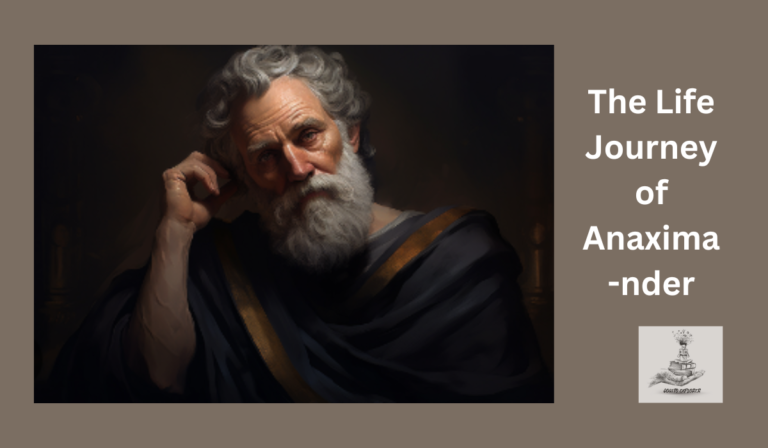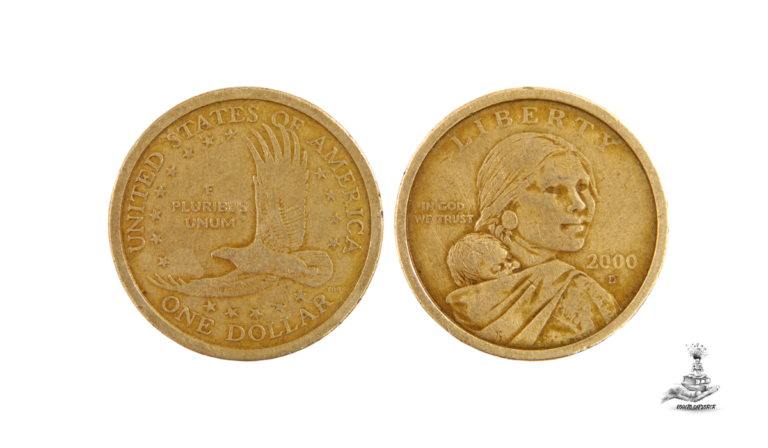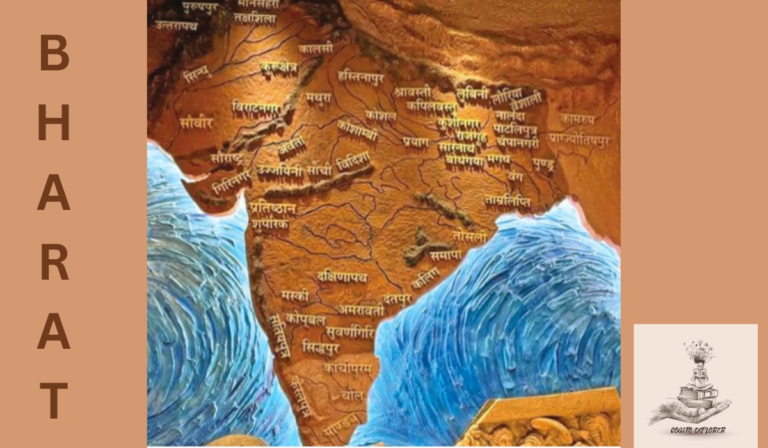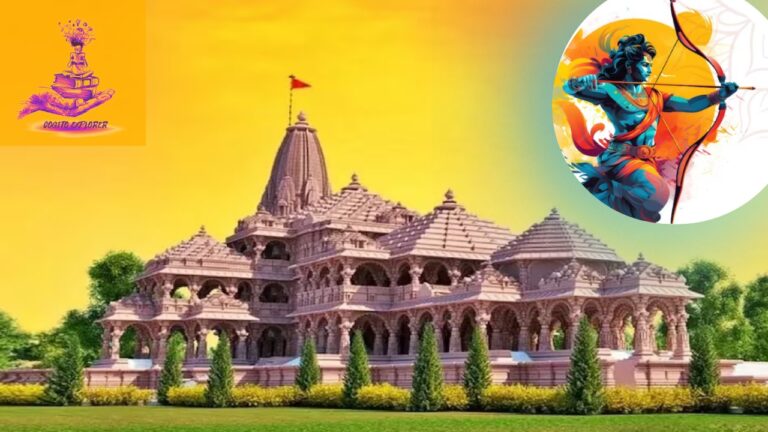Kanyakumari’s Cultural Beacon: Tiruvalluvar’s Timeless Legacy
Tiruvalluvar, a revered Tamil poet and philosopher, is celebrated for his timeless work, the Tirukkural. Born over 2,000 years ago in ancient India, his contributions to literature and philosophy have left an indelible mark on Tamil culture and beyond. This essay delves into the life and legacy of Tiruvalluvar, exploring the significance of the Tirukkural, its thematic divisions, and the enduring wisdom it imparts.
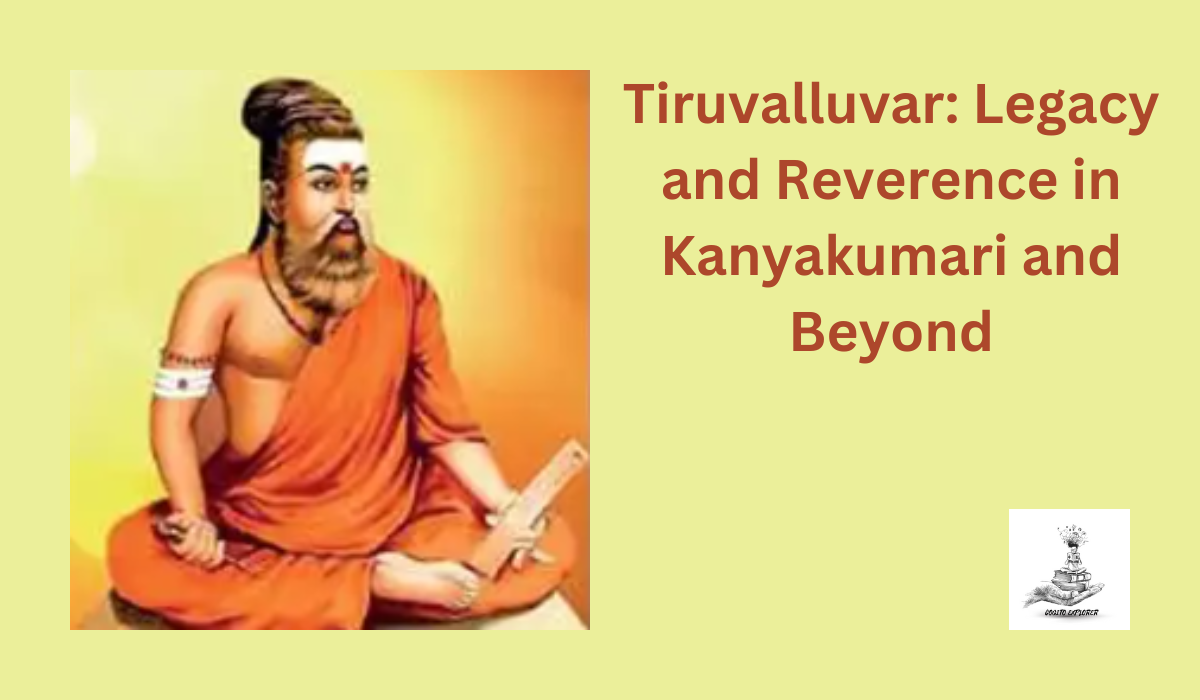
Life of Tiruvalluvar: A Historical Enigma
The historical details surrounding Tiruvalluvar’s life are shrouded in mystery, contributing to the enigma that surrounds this illustrious figure. While some scholars assert that he lived during the Sangam period, around the 3rd century BCE. Others place him in a later time frame, between the 5th and 6th centuries CE. The lack of concrete evidence has led to various interpretations and debates about his existence. But what remains undebatable is the profound impact of the Tirukkural on literature and ethical philosophy.
Tirukkural: An Ethical Magnum Opus
The crowning jewel of Tiruvalluvar’s literary legacy is the Tirukkural, a masterpiece that consists of 1,330 couplets. Succinctly capturing the essence of life, ethics, and governance. Divided into three sections – Aram (virtue/ Dharam), Porul (wealth/ Artha), and Inbam (love/ Kaam) – the Tirukkural addresses the fundamental aspects of human existence. Each couplet (Kural) is a poetic gem encapsulating profound wisdom and ethical principles.
Aram: Virtue as the Foundation of a Noble Life (Dharam)
The first section of the Tirukkural, Aram, is dedicated to virtue and moral conduct. Tiruvalluvar emphasizes the importance of leading a righteous life, grounded in principles that foster harmony and ethical behavior. The Kurals under Aram touch upon various virtues, including honesty, integrity, gratitude, and humility. One of the central tenets of Aram is the concept of dharma or righteous duty. Serves as a guiding principle for individuals in their personal and societal roles.
Tiruvalluvar’s exploration of virtue extends beyond individual conduct to encompass the broader context of governance. He underscores the idea that a just ruler is guided by ethical principles. Ensures the well-being of the entire society. Aram, thus, lays the foundation for an ethical framework that transcends personal boundaries and extends to the collective welfare of the community.
Porul: Navigating the Ethical Landscape of Wealth and Prosperity (Artha)
The second section of the Tirukkural, Porul, delves into the ethical considerations surrounding wealth and material prosperity. Tiruvalluvar provides insights into the responsible and ethical accumulation of wealth, cautioning against greed, exploitation, and dishonest practices. The Kurals under Porul advocate for a balanced approach to wealth, where economic success is coupled with social responsibility.
In Porul, Tiruvalluvar recognizes the interconnectedness of economic prosperity and ethical conduct. He emphasizes the role of wealth in fulfilling one’s duties and responsibilities towards family, society, and the larger community. The section reflects a nuanced understanding of the ethical challenges posed by wealth and the need for individuals to navigate this terrain with a sense of moral responsibility.
Inbam: The Ethical Dimensions of Love and Pleasure (Kaam)
The third and final section of the Tirukkural, Inbam, explores the realm of love and pleasure. Tiruvalluvar, with poetic finesse, discusses the ethical dimensions of human relationships. Highlighting the importance of love, compassion, and mutual understanding. The Kurals under Inbam touch upon various facets of love, including the bond between spouses, parental love, and the broader sense of compassion for all living beings.
Inbam, while addressing the intimate aspects of human emotions, also underscores the ethical principles that should guide these relationships. Tiruvalluvar extols the virtues of fidelity, respect, and empathy in the context of love. This section, like Aram and Porul, reinforces the overarching theme of ethical living that permeates the entire Tirukkural.
The universality of Tirukkural: A Timeless Guide to Ethical Living
One of the remarkable aspects of the Tirukkural is its universal appeal. Despite being rooted in the cultural and linguistic context of ancient Tamil society. Tiruvalluvar’s ethical teachings transcend geographical and temporal boundaries. The principles espoused in the Tirukkural resonate with people across diverse cultures and civilizations.
The Tirukkural addresses the fundamental aspects of human existence (the Purusartha) -virtue (Dharam), wealth (Artha), and love (Kaam)- in a way that transcends the limitations of time and space. The universality of its teachings lies in the profound truths it communicates about the human experience. The ethical principles articulated by Tiruvalluvar are not confined to a specific cultural or religious paradigm. But speak to the universal quest for a meaningful and virtuous life.
Other Literary Contributions
While Thirukkural is the most well-known and widely accepted work attributed to Thiruvalluvar, some other texts have been traditionally attributed to him. However, the authenticity of these works is debated among scholars, and there is uncertainty regarding their authorship. Here are a couple of other works that are sometimes associated with Thiruvalluvar:
Tirukkural Bhashya: It is believed by some that Thiruvalluvar wrote a commentary on his work. The Thirukkural known as Tirukkural Bhashya. It provides explanations, interpretations, and insights into the verses of the Thirukkural. However, the attribution of this commentary to Thiruvalluvar is not universally accepted. Some scholars suggest that it might have been the work of later commentators.
Thiruvalluva Maalai: This is a collection of 100 verses structured in a poetic form that praise Lord Murugan (also known as Subramanya, Kartikeya, or Skanda) traditionally attributed to Thiruvalluvar. The verses often depict the divine qualities, exploits, and grace of the deity. It reflects the devotee’s aspiration for spiritual progress, divine blessings, and the removal of obstacles in life through the grace of Lord Murugan. The Thiruvalluva Maalai is considered a devotional work and is distinct from the ethical and didactic nature of the Thirukkural.
As historical evidence supporting Thiruvalluvar’s authorship is limited, and these attributions are based on tradition and legends. The Thirukkural remains the most significant and acknowledged work associated with Thiruvalluvar, and it continues to be highly revered for its ethical and philosophical teachings.
Tiruvalluvar’s Influence on Tamil Culture and Beyond
Tiruvalluvar’s impact extends beyond the literary realm. He is venerated as a sage and cultural icon in Tamil society. His teachings have become an integral part of Tamil cultural consciousness, influencing literature, art, and education. The Tirukkural is often cited in ethical discourse, and its verses are memorized and recited by generations as a guide to virtuous living.
Tiruvalluvar’s influence permeates Tamil culture and society. His teachings have become an integral part of ethical discourse. Shaping social thought and cultural practices. The Tirukkural is not merely a relic of the past. It lives on as a dynamic force, guiding individuals and communities in their quest for a virtuous and meaningful existence.
In Tamil Nadu, Tiruvalluvar is venerated as a cultural icon, and his teachings are woven into the fabric of daily life. Educational institutions, government offices, and public spaces often bear his name, reflecting the deep respect accorded to the sage. Thiruvalluvar Day is observed annually in Tamil Nadu on the second day of the Tamil month Thai (January 16 or 17) as a day of celebration and reflection on the enduring relevance of Tiruvalluvar’s teachings.
Beyond Tamil Nadu, Tiruvalluvar’s legacy has permeated the broader Indian cultural landscape. Translations of the Tirukkural into various languages have enabled a wider audience to access its timeless wisdom. Scholars and thinkers from diverse backgrounds have acknowledged the philosophical depth of Tiruvalluvar’s work, contributing to its recognition as a valuable heritage of humanity.
Challenges and Critiques
While Tiruvalluvar and the Tirukkural are widely celebrated, it is essential to acknowledge the challenges and critiques that have been raised. Some scholars have questioned the historical authenticity of Tiruvalluvar. Pointing to the lack of concrete evidence about his life. Additionally, interpretations of certain Kurals may vary, leading to debates about the intended meaning and context.
Critics have also raised concerns about the gender perspectives in the Tirukkural. Arguing that some verses reflect patriarchal norms prevalent in ancient societies. While Tiruvalluvar’s work is a product of its time, these critiques highlight the importance of critically engaging with historical texts. Recognizing the cultural contexts in which they were composed.
Tiruvalluvar’s poetic craftsmanship is evident in the simplicity and elegance of his language. His mastery of Tamil, coupled with the rhythmic beauty of the verses, has contributed to the enduring appeal of the Tirukkural. Its aphoristic style and concise expression make it accessible to readers of diverse backgrounds, contributing to its widespread popularity.
Kanyakumari: Realm of Tiruvalluvar Ideals
Kanyakumari, the southernmost tip of the Indian subcontinent, stands witness to the confluence of the Arabian Sea, the Bay of Bengal, and the Indian Ocean. It is in this picturesque locale that a monumental tribute to Tiruvalluvar takes the form of the Thiruvalluvar Statue. The statue, erected on a small island off the coast of Kanyakumari, serves as a visual manifestation of Tiruvalluvar’s enduring legacy.
Tiruvalluvar Statue: A Symbol of Reverence

The Thiruvalluvar Statue is an architectural marvel that pays homage to Tiruvalluvar’s contribution to literature and philosophy. Standing at a height of 133 feet—one foot for each chapter of the Tirukkural—the statue is a testament to the magnitude of Tiruvalluvar’s wisdom.
Situated on a small rocky island named Rock of Kanyakumari or Kurunthamalai, the statue is strategically positioned to overlook the convergence of the three seas. The placement symbolically underscores the universal nature of Tiruvalluvar’s teachings, which are envisioned to flow across geographical boundaries like the merging waters.
The statue was unveiled on January 1, 2000 by the then Chief Minister of Tamil Nadu, M. Karunanidhi has become a prominent landmark in Kanyakumari. Its grandeur draws visitors from far and wide, not only as a tribute to Tiruvalluvar but also for the breathtaking panoramic views it offers of the surrounding seas and landscapes.
Architectural Details
Designed by the renowned Indian sculptor V. Ganapati Sthapati, the Thiruvalluvar Statue is an amalgamation of artistic finesse and engineering prowess. The statue comprises three main components: the pedestal, the pedestal neck, and the statue itself. The pedestal and pedestal neck together form the base, while the statue is perched atop, gazing out towards the seas.
The entire structure is crafted from 7000 blocks of granite, meticulously assembled to create a seamless and imposing monument. The statue is adorned with a flowing robe, adding a touch of grace to its monumental stature. The face, hands, and feet are sculpted with precision. Capturing the essence of Tiruvalluvar’s dignified and contemplative persona.
Symbolic Significance
The Thiruvalluvar Statue goes beyond its architectural magnificence; it carries profound symbolic significance. The height of 133 feet corresponds to the 133 chapters of the Tirukkural. Emphasizing the integral connection between the sage’s teachings and the monumental tribute. The statue is positioned in such a way that it appears to stand sentinel over the seas. Symbolizing the enduring relevance and universality of Tiruvalluvar’s wisdom.
The choice of Kanyakumari as the location for the statue is also symbolic. Kanyakumari is often associated with spiritual connotations and is revered as a sacred site. Adds a spiritual dimension to the homage paid to Tiruvalluvar. The statue, with its commanding presence, becomes a beacon of enlightenment. Inviting contemplation on the timeless wisdom encapsulated in the Tirukkural.
Tourist Attraction and Cultural Hub
The Thiruvalluvar Statue has become a major tourist attraction, drawing visitors not only for its visual splendor but also for the cultural and historical significance it represents. The site has become a hub for cultural events, exhibitions, and gatherings, further amplifying the resonance of Tiruvalluvar’s legacy.
Tourists and pilgrims flock to the site to witness the grandeur of the statue and to take in the breathtaking views of the surrounding seas. The island, accessible by a short ferry ride, has become a pilgrimage of sorts for those seeking not only the natural beauty of Kanyakumari. But also a connection with the profound teachings of Tiruvalluvar.
Cultural Celebrations in Kanyakumari
Kanyakumari, with its blend of natural beauty and cultural significance, serves as a fitting backdrop for the celebration of Tiruvalluvar Day. On this day, the statue and its surroundings come alive with cultural events, musical performances, and literary discussions. The vibrant atmosphere reflects the enduring impact of Tiruvalluvar’s teachings on the cultural ethos of the region.
Local communities actively participate in the festivities, organizing processions, seminars, and cultural programs that pay homage to Tiruvalluvar’s legacy. The statue, standing tall amidst the festivities, becomes a focal point for cultural exchange, intellectual discourse, and communal celebration.
Conclusion
Tiruvalluvar, the enigmatic sage of Tamil Nadu, leaves an indelible mark on the cultural and spiritual landscape through the enduring wisdom of the Tirukkural. The Thiruvalluvar Statue in Kanyakumari stands not just as a monumental tribute but as a visual reminder of his profound impact on literature, philosophy, and culture. The historical enigma surrounding Tiruvalluvar adds to the mystique of his persona, making him a revered figure whose legacy transcends time and space.
As visitors connect with the Thiruvalluvar Statue, they engage with a timeless legacy that inspires generations to navigate life’s complexities with virtue, wisdom, and grace. Tiruvalluvar’s insights into virtue, wealth, and love, as articulated in the Tirukkural, continue to resonate across cultures, emphasizing the enduring power of ethical wisdom encapsulated in poetic verses. His influence on Tamil culture and the broader intellectual landscape is undeniable, reinforcing the universal principles that guide a noble and virtuous life. In essence, Tiruvalluvar’s legacy endures as a beacon of ethical enlightenment, resonating through the ages.



